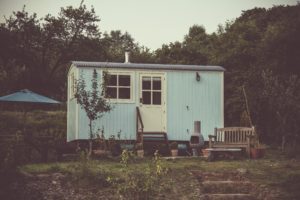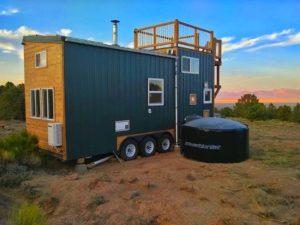Today’s 20-somethings are doing more than Netflix-and-chilling, they’re moving out of their folks’ places and living in tiny houses. There are several reasons why living in these little dwellings appeal to the Y Generation (and everyone else!). Read on for just a few.
Off the Grid

From Mobile Phones to Mobile Homes
“Millennials don’t want to be tied down,” said Megan Smyth, CEO of FitReserve, an exercise boutique that doesn’t require a membership to take classes. “It’s a spontaneous demographic.” While they still spend money like older generations, it is more experience driven, going towards food, traveling, etc. Tiny homes are perfect for wanderlusty millennials who want to go wherever the insta-wind takes them. According to Jeff Fromm from Forbes, millennials “might not need the same space, permanence, and practicality” most Americans want from their housing. This is apparent as tiny homes trend with young folks. Most tiny home owners set their homes on a trailer frame to haul.
Flexibility: “Weird Flex But Okay”
With a rise in bean bag chair corporations and coffee shop offices (coffices?), it is clear that millennials are loosening things up in corporate America. People can use tiny homes as home offices, in addition to homes for returning adult children. Though millennials have a reputation for being lazy, Psychologist Brenda Bauer, Psy.D. from Psychology Today says, “they work hard and feel strongly about wanting their work to be meaningful in ways that older generations typically do not insist upon.” With minimal ‘stuff’ to distract, people living in tiny houses can find more time and resources to focus on their work, aspirations, and hobbies.
Less House, Less Work
Minimalism allows time for what people really care about. At an average of 12 times less space than your typical home, it’s no wonder tiny houses require less maintenance. It probably gets dirtier quicker, but it’s also faster to clean up, and isn’t an issue if you’re fairly tidy. Heating and cooling in tiny houses, water, electrical, and waste are self-sustaining. Propane tanks and composting toilets virtually take care of themselves. With a tiny house gas heater or propane heating blanket in winter conditions, you have extra time, as well as security that everything will work the way it should when it gets cold outside.
Pinching Pennies and Self Sufficiency

Little Foot, Bigfoot, Carbon Footprint

For some, these structures are literal: tiny homes.
Sources:
-Taylor, Kate. “‘Psychologically Scarred’ Millennials Are Killing Countless Industries from Napkins to Applebee’s – Here Are the Businesses They like the Least.” Business Insider. October 31, 2017. Accessed November 01, 2018. https://www.businessinsider.com/millennials-are-killing-list-2017-8#casual-dining-chains-like-buffalo-wild-wings-and-applebees-1.
-“Tiny House Infographic.” The Tiny Life. January 12, 2018. Accessed November 01, 2018. https://thetinylife.com/tiny-house-infographic/.
-“Tiny House Statistics.” Restoring Simple. Accessed November 01, 2018. http://restoringsimple.com/tiny-house-statistics/.
-“Why Do Millennials Get a Bad Rap?” Psychology Today. Accessed November 01, 2018. https://www.psychologytoday.com/us/blog/psychoanalysis-unplugged/201704/why-do-millennials-get-bad-rap.
Keep your propane tanks at the perfect pressure with Powerblanket.






